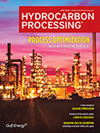Process Optimization
ExxonMobil signs carbon capture agreement with CF Industries in Mississippi (U.S,)
ExxonMobil has signed its fourth carbon capture and storage agreement with CF Industries. ExxonMobil will transport and permanently store up to 500,000 tpy of captured CO2 from CF Industries’ complex in Yazoo City, Mississippi.
Digital Feature: Paraffin wax: A detailed look at its production process
In this article, ExxonMobil provides a walkthrough of paraffin wax production, highlighting the company's DILCHILL™ process.
AVEVA’s integrated EPC 4.0 solutions to drive digital twin for Meridian's new greenfield refinery
AVEVA announced a strategic partnership with Meridian Energy Group to develop a digital twin for the first full-conversion refinery built in the U.S. since 1976, and the first modern "greenfield" advanced technology refinery constructed in the U.S. ever.
Clariant's OleMax 260 catalyst delivers strong performance for EQUATE Petrochemical Co.
Clariant announced one-year of successful operation of its novel OleMax 260 catalyst at EQUATE Petrochemical Company’s world-scale steam cracker in Kuwait.
Boeing to test Firefly Green Fuels' sewage waste to SAF technology
The companies will help in testing and advancing Firefly Green Fuels’ cutting-edge technology to increase sustainable aviation fuel (SAF) production in the UK.
BASF, University of Graz develop new computer-assisted model to optimize biocatalytic production processes
BASF, University of Graz develop new computer-assisted model to optimize biocatalytic production processes The computer model enables a new understanding of enzymatic catalysis, production processes can be scaled up faster from the lab to industrial manufacturing, and it provide greater sustainability in biocatalysis thanks to lowered costs and resource consumption.
CONSER awarded feasibility study for maleic anhydride plant in North America
MAIRE announced that NEXTCHEM (Sustainable Technology Solutions), through its subsidiary CONSER, has been awarded a feasibility study in North America by a leading industrial player to optimize an existing maleic anhydride facility.
Clariant's MegaZonE catalyst delivers strong results in Chinese methanol plant
Clariant announced that its MegaZonE technology is delivering excellent performance in the 600,000-tpy methanol plant of CNOOC’s China Blue Chemical Ltd.
Stamicarbon awarded energy efficiency contract for urea plant in China
NEXTCHEM’s subsidiary Stamicarbon will upgrade an existing 3,100-tpd urea plant to reduce energy consumption by up to 20%, thanks to its proprietary Advanced MP Flash Design technology.
BASF achieves ISCC+ certification across all its global major production sites for acrylics, alcohols, glycol ethers and acetates
BASF achieves ISCC+ certification across all its global major production sites for acrylics, alcohols, glycol ethers and acetates. With this step, BASF is now able to produce more than 60 products related to this portfolio with one or more sustainability attributes.

- Petrobras wrapping up due diligence to buy back refinery from Mubadala 7/26
- US court rejects EPA denials of 2022 small refinery biofuel waivers 7/26
- Mexico seeks more 2025 fuel import deals after refinery delays 7/26
- PETRONAS, Eni and Euglena reach FID to construct a biorefinery in Malaysia 7/26
- ExxonMobil signs carbon capture agreement with CF Industries in Mississippi (U.S,) 7/26
- WoodMac: LNG truck sales impacting Chinese road diesel demand 7/26
- Digital Exclusive: SPECIAL FOCUS: Digital Technologies—Utilize process simulation digital twin to optimize condensate yield
- Digital Exclusive-Flare system design: Liquid pockets in flare headers
- Hydrogen-rich content gasoline: A new concept for paraffinic gasoline reformulation
- Alarm rationalization at Kuwait National Petroleum Company (KNPC) refineries




